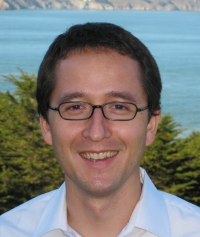Dignity, Sense of Control Keys to Quality of Life for Disabled Elderly, Study Finds
Dignity, Sense of Control Keys to Quality of Life for Disabled Elderly, Study Finds
Most Disabled Seniors Rate Their Quality of Life “Fair to Very Good”
Quality of life for disabled elderly people is most closely tied to two factors: a sense of dignity and a sense of control, according to a study by researchers at the San Francisco VA Medical Center (SFVAMC) and the University of California, San Francisco (UCSF).

Alexander Smith, MD, MPH
“By ‘control,’ these elders mean a sense of autonomy in their activities of daily living,” said lead author Jennifer King, MD, who was a student at the UCSF School of Medicine at the time of the study. “Because of disability, not all of them are able do to all activities on their own, but they want to feel they have some say in how those activities progress throughout the day.”
The two factors were singled out as important by members of all ethnic groups in the study, which was based on a series of qualitative interviews with 62 disabled elders. The ethnic groups represented included white, African American, Latino and Chinese American.
When asked to rate the quality of their own lives on a five-point scale that ranged from “excellent” to “poor,” 87 percent of the elders responded “fair to very good,” which was in the middle of the scale.
“These folks are not doing badly,” said senior investigator Alexander Smith, MD, MPH, a palliative medicine doctor at the UCSF-affiliated SFVAMC. “Their quality of life, as they rate it, is definitely higher than some might assume it would be for older people with disabilities.”
The study was published electronically on Jan. 31 in the Journal of the American Geriatrics Society.
The study participants were all recruited from the On Lok Lifeways program in San Francisco. The day program provides social, health, nutrition, rehabilitation and other services to older adults who meet Medicaid requirements for residence in a nursing home but wish to remain in their own homes.
“One of the limitations of this study is that we only looked at older adults in On Lok, which is a model program for the entire country,” said Smith, who is also a Greenwall Faculty Scholar in Bioethics and an assistant professor of medicine in the Division of Geriatrics at UCSF. “It could be that their high quality of life is simply a reflection of the dignity and sense of control they get as participants in the program – or it could be that we, as younger people, have preconceived notions about what it’s like to live with late-life disability. That’s something that future research needs to tease out.”
“As the number of elders from diverse backgrounds with late life disability increases, we need to learn how to assess their quality of life, and develop an assessment scale that will adequately reflect what they tell us is important,” said King. “With those tools, we can then create interventions to improve their quality of life.”
Co-authors of the study are Lindsey Yourman, MD, of UCSF; Cyrus Ahalt, MA, of UCSF and SFVAMC; Catherine Eng, MD, of UCSF and On Lok Lifeways; Sara J. Knight, PhD, of SFVAMC and UCSF; and Eliseo J. Pérez-Stable, MD, of UCSF.
The study was supported by funds from the National Institutes of Health, Atlantic Philanthropies, Society of General Internal Medicine, John A. Hartford Foundation and Association of Specialty Professors. Some of the funds were administered by the Northern California Institute for Research and Education.
NCIRE – The Veterans Health Research Institute – is the largest research institute associated with a VA medical center. Its mission is to improve the health and well-being of veterans and the general public by supporting a world-class biomedical research program conducted by the UCSF faculty at SFVAMC.
SFVAMC has the largest medical research program in the national VA system, with more than 200 research scientists, all of whom are faculty members at UCSF.
UCSF is a leading university dedicated to promoting health worldwide through advanced biomedical research, graduate-level education in the life sciences and health professions, and excellence in patient care.
By Steve Tokar
University of California, San Francisco (UCSF)
###
> About University of California, San Francisco (UCSF).
The University of California, San Francisco (UCSF) is a leading university dedicated to promoting health worldwide through advanced biomedical research, graduate-level education in the life sciences and health professions, and excellence in patient care. It is the only UC campus in the 10-campus system dedicated exclusively to the health sciences.
More about University of California, San Francisco (UCSF).
More about University of California, San Francisco (UCSF). Information.
###
* The above story is adapted from materials provided by University of California, San Francisco (UCSF)
________________________________________________________________




















